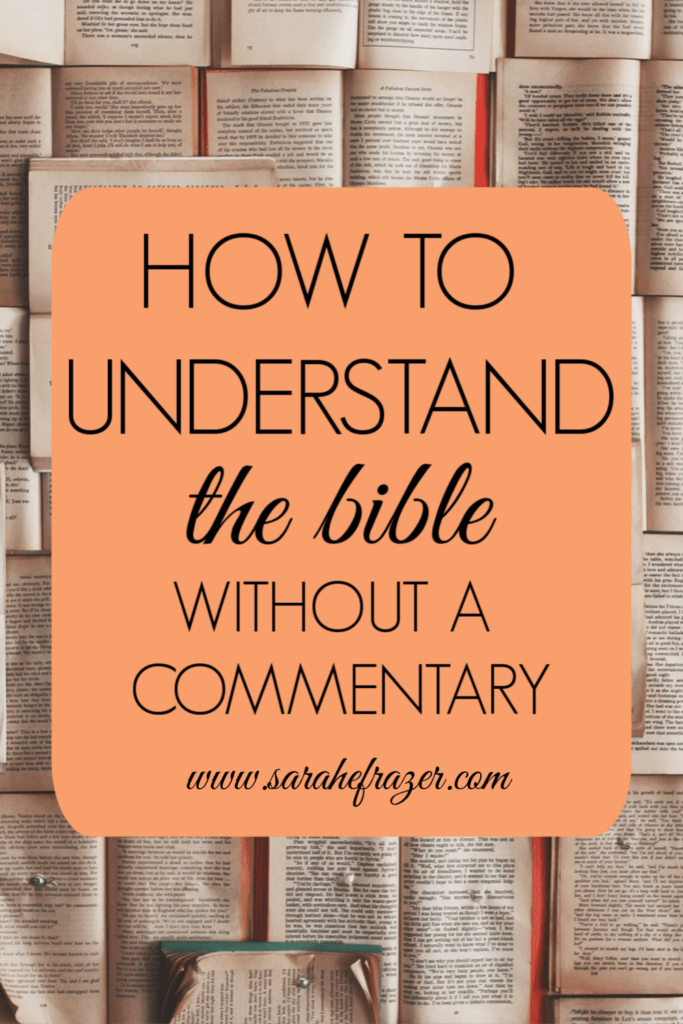How to Study the Bible for Beginners – Without Using Commentaries

How to Study the Bible for Beginners – Without Using Commentaries
When I was in college I picked up one of my dad’s commentaries. It was in the book of Hebrews. I remember reading it cover to cover. There is no way I can remember why I even did this, but reading that commentary opened my eyes to the fact that there are men (and women) who have studied the Bible so thoroughly I didn’t have to. After reading so in-depth in Hebrews I feel more deeply in love with that book of the Bible and I was drawn to the Old Testament to compare Jesus’ work and life to that of the prediction about the Messiah found in the writings of the prophets. I so enjoyed reading that commentary!
Don’t get me wrong, I love commentaries. I have shelves (plural) of commentaries. When I write for First5.org or Crosswalk.com, I always use a commentary after I’ve done my own personal study. Good commentaries are great resources for any Bible reading, scholar, and teacher. Commentaries will provide a unique perspective and give insight into historical contexts we normally might miss. This post is not against using commentaries, but after reading Jen Wilkin’s book Women in the Word, I realized I had become too reliant on commentaries to tell me what the passage meant rather than using my own observations. There is nothing wrong with consulting a commentary if something is confusing, but often sitting with a passage or a verse for a few days can provide enough insight to answer our questions.
So today, as the beginner, I want to encourage you to get your hands on as many commentaries as you can. You can find a good list of both free and paid versions below. However, you don’t need a commentary to study the Bible! God does not require us to use a commentary to understand His word. I’m going to show you how to study the Bible for beginners without using commentaries. Most of the Bible can be understood by using these five methods below.

How to Understand the Bible (Without Commentaries)
- Read it and read it again and again and again. I resisted this step for a long time. I’m not a big fan of reading things over again. In fact, I know people who will reread books they’ve read before and I just don’t get it. Why would you want to spend time reading when you know the end? This is not the case with the Bible. the Bible is not like other books. Reading a passage or verse over and over again helps further our understanding. It allows us to emphasize different words as we read. It brings out areas in which we might have missed the first time around. I can’t tell you how many times I’ve read Genesis – but each time I do, I walk away with a new perspective, a new fact, or a new way of looking at God. When you are stuck understanding
- Write it. I started writing God’s word a few years ago. As I wrote familiar passages in a journal I began to see things I never noticed before. Slowing down and writing each word allows me to focus on smaller portions of scripture and really meditate on the truth in each individual verses. This helps when I am trying to study an entire book or chapter. Slowing down is key and writing helps me to do that!
- Look at cross references. This takes a little more effort and you will need a computer or other book for this. If there is a word or phrase repeated in the passage, I would suggest you look in a concordance or Biblegateway.com or BlueletterBible.org to find other passages in the Bible with that same word or phrase. Sometimes our Bibles have these in the margins or footnotes as well. What other passages are listed to “go with” what you are studying? Many times God’s word can explain itself!
- Prayer. Do not neglect the discipline of prayer when it comes to Bible study. I’ve written a lot about prayer and Bible study. You can download some prayers to pray over your Bible study here.
- Make sure you have read the context. So many times we take verses out of context. I know I am guilty of that. So make sure you have read at least the chapter before or the chapter after. If the passage you are studying is in a smaller book, make sure to read the entire book to get a feel of what the purpose of the whole book is.
These are not in order or steps to take. These are things you should be doing all at the same time when it comes to Bible study. You might not do all of these in one sitting or session, but make sure you are incorporating all of these things when you are studying a particular passage. Commentaries are useful, but not necessary when we study.

Commentaires I Recommend Are These: *
- Matthew Henry’s (FREE)
- John MacArthur (Amazon)
- The Treasury of David (FREE)
- Martin Luther’s Commentary (FREE)
- Warren Wiersbe (Amazon)
*Affiliate links included in this post.
I hope I can encourage you to GET IN GOD’S WORD and FALL IN LOVE WITH GOD’S WORD! Download a copy of my brand new study/workbook/journal here.

QUESTION:
What is your biggest struggle when it comes to Bible reading and prayer? Comment below and I’d love to send you a FREE resource I might have to help you!
Sarah E. Frazer is a writer and Bible study mentor at sarahefrazer.com. She is the wife of Jason and mother of five who all serve as full-time missionaries in Honduras. Her passion is to encourage women to fall in love with the Bible. Sarah is the author of several Bible study resources for women. She shares tools for deep-rooted Bible study at sarahefrazer.com. Follow her on Instagram (http://www.instagram.com/sarah_e_frazer) and join her free prayer challenge at sarahefrazer.com/prayer

I would love to learn to pray more and better for my daily life.
Great advice! I love doing my own study first and then looking at the commentaries to see if there was a point of view I missed.